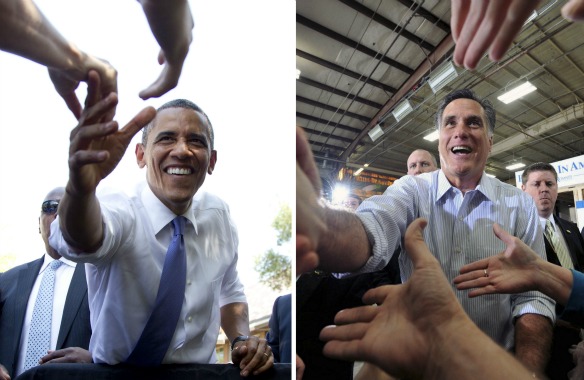
Despite a flagging economy and energized opposition, President Obama assembled a winning coalition that delivered him a second term in the White House. Yet even in the wake of this successful election, it is important to note that the championing of liberal social issues that formed a key part of the Obama campaign’s rhetoric poses a long-term threat to the Democratic Party’s electoral chances.
Rhetoric matters. And rhetoric created cracks even in Obama’s winning coalition, cracks that show up when we look at the exit polling. The Pew Forum found that Obama’s margins held fairly steady among most religious and racial groups—white evangelical Protestants, black Protestants, Hispanic Catholics—but dropped markedly among white Catholics.
The University of Akron’s John Green believes that this drop came because of the Obama administration’s embrace—and vocal defense—of the so-called HHS Mandate. As The Denver Post’s Eric Gorski wrote, “[T]hose unlikely to be swayed by the bishops’ focus on abortion may have been more open to the religious liberty argument, even if they disagree with (and ignore) the church’s ban on artificial contraception.”
Green and Gorski are right. Despite carefully targeted ads suggesting Republicans wanted to ban contraception (no Republican candidate has made such a proposal), Obama actually lost ground among women, winning 55 percent of female votes versus 56 percent in 2008. Obama’s vocal backing of liberal social issues may have energized activists, but it did not sway many swing voters.
At least not toward him. The day after the election I flew home to the Midwest for the opening of Nebraska’s deer hunting season. I landed in Omaha, a city that Obama won in 2008, but not in 2012. (Nebraska divvies out electoral votes by congressional district, meaning that even a candidate who loses the state can win electoral votes.)
Most campaign signs were still standing. By far the most notable were the 147 banners displayed by Catholic churches in the Archdiocese of Omaha. The large signs, placed on church’s front lawns, had slogans like “Religious Liberty: Our Most Cherished Freedom.” The sign in front of my home church read, “Protect the Unborn, Defend Marriage, Safeguard Liberty.” The Catholic Church in greater Omaha responded in force to Obama’s rhetorical prioritization of contraceptive access over safeguarding conscience.
What does this all mean for the future of American politics? It means a realignment of the Catholic Church, as described by R.R. Reno in a forthcoming issue of First Things: “The princes of the Church are not fools … They’re making the same judgment call that the great leaders of the immigrant Church made: get on the side that will defend the Church and protect the faithful.”
The banner campaign of Nebraska Catholics was only a small part of a nationwide effort. The much-publicized “Fortnight for Freedom Campaign” this summer was designed to ensure that every American Catholic attending mass was informed of the Obama administration’s assault on the Church’s conscience. Pew’s data gives us statistical reason to think these efforts worked.
Democrats don’t need Omaha to win the White House. But they do need Rust Belt states with high Catholic populations, especially in light of the weakening influence of unions. They will need to perform much better than Obama did among white Catholics if future Democratic campaigns are unable to preserve historically high margins (and turnout) among black voters and Hispanics.
Obama’s vocal support for social issues, which many Catholics understood as an attack on their right to worship as their faith dictates, has made this harder for future Democratic candidates, but far from impossible. In the event that the courts overturn the mandate, the administration should stand down. Future Democratic White House hopefuls would be wise to change their party’s tune (or at least stop singing) on other social issues. In seven out of eight states where there were social issues on the ballot, the support for the liberal side of the issue lagged behind support for Obama. Some were willing to accept Obama while not accepting his campaign rhetoric on same-sex marriage, abortion, and the HHS mandate. How many weren’t?
I do not presume to tell Democrats what rhetoric their party ought to adopt. Still it is worth their while to acknowledge that Democrats in the Obama mold pay an electoral price for their current rhetoric on social issues, one that very well might result in a future loss of the White House.
